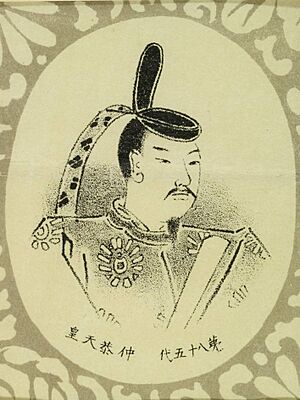Emperor Chūkyō facts for kids
Quick facts for kids Emperor Chūkyō仲恭天皇 |
|||||
|---|---|---|---|---|---|
 |
|||||
| Emperor of Japan | |||||
| Reign | May 13, 1221 – July 29, 1221 | ||||
| Predecessor | Juntoku | ||||
| Successor | Go-Horikawa | ||||
| Born | October 30, 1218 | ||||
| Died | June 18, 1234 (aged 15) | ||||
| Burial | Kujō no Misasagi (九條陵) (Kyoto) | ||||
|
|||||
| House | Yamato | ||||
| Father | Emperor Juntoku | ||||
| Mother | Fujiwara no Ritsushi | ||||
Emperor Chūkyō (仲恭天皇, Chūkyō-tennō) (born October 30, 1218 – died June 18, 1234) was the 85th emperor of Japan. His time as emperor was very short, lasting only about two months in the year 1221. Because his reign was so brief, he wasn't officially listed as an emperor until 1870. His tomb, called Kujō no misasagi, is located near Tōfuku-ji in Fushimi-ku, Kyoto.
Family and Early Life
Before he became emperor, his personal name was Kanenari-shinnō (懐成親王).
He was the first son of Emperor Juntoku. His mother was Ritsushi, who was the daughter of Kujō Yoshitsune.
- Wife: Ukyonodaibu-no-Tsubone (a priest's daughter)
- Daughter: Imperial Princess Yoshiko (born 1234 – died 1289). She was later known as Wademon’in.
Key Events of Chūkyō's Reign
Chūkyō became emperor when he was only two years old. This happened because his father, Emperor Juntoku, was removed from the throne. This removal was part of the preparations for the Jōkyū Incident. This was a failed attempt by Chūkyō's grandfather, the Retired Emperor Go-Toba, to overthrow the military government known as the Kamakura Bakufu.
- 1221 (Jōkyū 3, 20th day of the 4th month): Emperor Juntoku stepped down from the throne. His eldest son, who was just two years old, became the new emperor. Soon after, Emperor Chūkyō officially took the throne.
Later that same year, after the Jōkyū Incident, Chūkyō was removed from power. He was replaced by his first cousin once removed, Emperor Go-Horikawa. Go-Horikawa was the nephew of Emperor Go-Toba.
Because he was removed from the throne just two months after the Jōkyū Incident, his time as emperor was not fully recognized for a long time. People called him names like the Kujō Dethroned Emperor (Kujō Haitei), the Half-Emperor (Han-tei), or the Later Dethroned Emperor (Go-Haitei). This last name was a reference to Emperor Junnin, who was also called Haitei.
In 1870, he was finally recognized as a true Emperor. He was then given the official posthumous name of Emperor Chūkyō.
Era of Chūkyō's Reign
The time an emperor rules is often marked by a special era name or nengō. Emperor Chūkyō's very short reign was part of one such era:
- Jōkyū (1219–1222)
See also
 In Spanish: Chūkyō Tennō para niños
In Spanish: Chūkyō Tennō para niños
- Emperor of Japan
- List of Emperors of Japan
- Imperial cult
 | May Edward Chinn |
 | Rebecca Cole |
 | Alexa Canady |
 | Dorothy Lavinia Brown |

